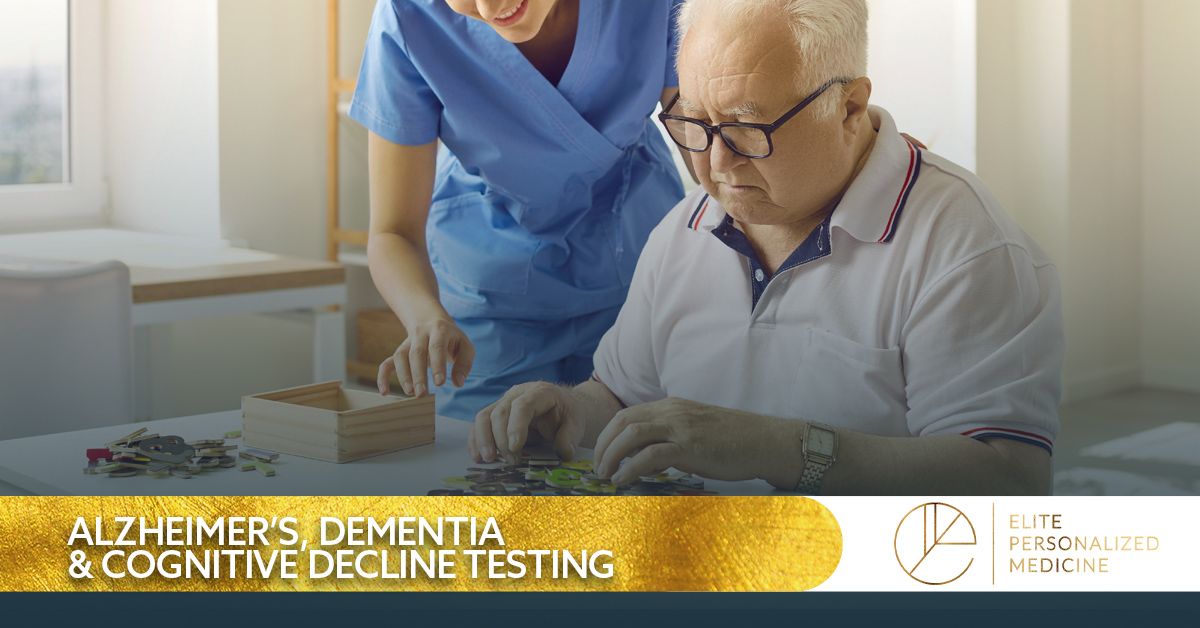Atlanta Testing for Alzheimer’s, Dementia and Cognitive Decline
Early detection is key to slowing the progression of Alzheimer’s disease, dementia and other forms of cognitive decline. At Elite Personalized Medicine, our integrative and functional medicine doctors use advanced testing and preventive therapies to detect and treat these debilitating conditions. We give patients clarity about their cognitive health, and identify the appropriate evidence-based natural treatments. Visit us in Peachtree Corners or Dacula for clinical testing.

Clinic Testing Services for Alzheimer’s and Dementia
While Alzheimer’s and dementia are usually associated with memory loss and confusion, their development occurs long before these symptoms become apparent. Detecting early markers of cognitive decline, including elevated tau proteins or beta-amyloid plaques, is crucial for slowing the decline and potentially improving outcomes.
We use proven diagnostic tests for Alzheimer’s and dementia to provide patients with accurate assessments of their cognitive health. With an accurate diagnosis, we can work with patients to develop a comprehensive treatment plan that includes the following factors.
- Taking proactive steps to slow disease progression.
- Implementing lifestyle changes to protect cognitive function.
- Accessing supplements and natural therapies in the early stages.
Our medical team will identify the need for preventive or therapeutic interventions, helping influence the course of these conditions for patients and their families.
Our Alzheimer’s and Dementia Testing Processes
At Elite Personalized Medicine, we provide several diagnostic tests to assess various aspects of cognitive decline to detect early signs of neurodegenerative conditions. When you visit our Atlanta-area centers we will typically use the following testing options.
Tau Protein Testing
Tau proteins are vital brain proteins that help maintain healthy brain cells. When tau proteins become abnormal and form tangles, this disrupts normal cell function, causing Alzheimer’s disease and other forms of dementia.
Our blood-based tau protein testing can identify if a person has raised tau levels linked to neurodegenerative changes. Such changes can be detected in their early stages, before clinical symptoms occur. With a positive or negative diagnosis, our medical team will assess whether preventive or rescue therapy is the most appropriate intervention.
Tau protein blood testing is minimally invasive, provides accurate results and can also be easily repeated to track changes over time. After a simple blood test at our Atlanta locations, our laboratory partners will provide reliable biomarker data to confirm or rule out an Alzheimer’s or dementia diagnosis.
Beta-Amyloid Plaque Testing
In Alzheimer’s disease and some forms of dementia, fragments of beta-amyloid protein build up between brain cells to form hard plaques that damage brain function. These deposits indicate the likelihood of future cognitive decline and are one of the most recognizable signs of Alzheimer’s.
Our beta-amyloid plaque test accurately evaluates plaque buildup in the brain. In combination with tau protein testing, this data allows medical professionals to provide an accurate assessment of a patient’s cognitive health.
Natural Therapies for Alzheimer’s Disease and Dementia
At Elite Personalized Medicine, we use our expertise in integrative and functional medicine practices to support patients after a positive diagnosis. Our natural therapies are personalized for the needs of each person and align with the multi-factor assessment, individualized treatments and lifestyle interventions those familiar with The Bredesen Protocol (ReCODE) will recognize.
- Nutritional Therapy – Tailored diet plans with beneficial nutrients and antioxidants.
- Customized Treatment – Combining diet, exercise, sleep optimization and stress management.
- Lifestyle Changes – Addressing hormonal imbalances, gut health, inflammation, blood sugar and toxins.
- Supplements – Targeted vitamins, minerals and other supplements to support brain health.
Using functional medicine principles, patients receive a holistic treatment program focused on the root causes of cognitive decline. This whole-body approach aims to target the multiple factors that influence cognitive health.
Telehealth Cognitive Testing for Alzheimer’s and Dementia
After your initial lab-based testing, follow-up consultations for cognitive health are available via our secure telehealth service. A skilled medical practitioner will review the results of your cognitive tests and discuss any early indications of cognitive decline.
When a patient shows signs of cognitive decline, Alzheimer’s or dementia, telemedicine can support patients with accessible care and early interventions. Our team will develop a comprehensive treatment plan to promote long-term brain health, and tackle any underlying issues that may be contributing to cognitive decline.
Common Questions About Alzheimer’s and Dementia Testing
Who should consider getting tested for cognitive decline?
People who should consider getting tested for cognitive decline include those experiencing memory problems or confusion. Testing is useful for those aged over 60, people with a family history of dementia and anyone noticing changes to cognitive abilities.
What is the difference between Alzheimer’s disease and dementia?
The difference between Alzheimer’s disease and dementia is that dementia is the general term for various conditions that affect memory and thinking abilities, while Alzheimer’s is a specific condition that is the most common cause of dementia.
How is Alzheimer’s and dementia testing performed?
Alzheimer’s and dementia testing is usually performed with a blood draw that is analyzed at a laboratory. The analysis looks for biomarkers that indicate brain changes. Medical history and cognitive assessments also help inform a diagnosis.
Early Detection Testing for Alzheimer’s and Dementia in Atlanta
Elite Personalized Medicine is a trusted provider of clinical testing for Alzheimer’s disease, dementia and cognitive decline. We help patients with early detection and natural treatment options at locations in Peachtree Corners and Dacula. Call (770) 416-1070 or request an appointment now.






